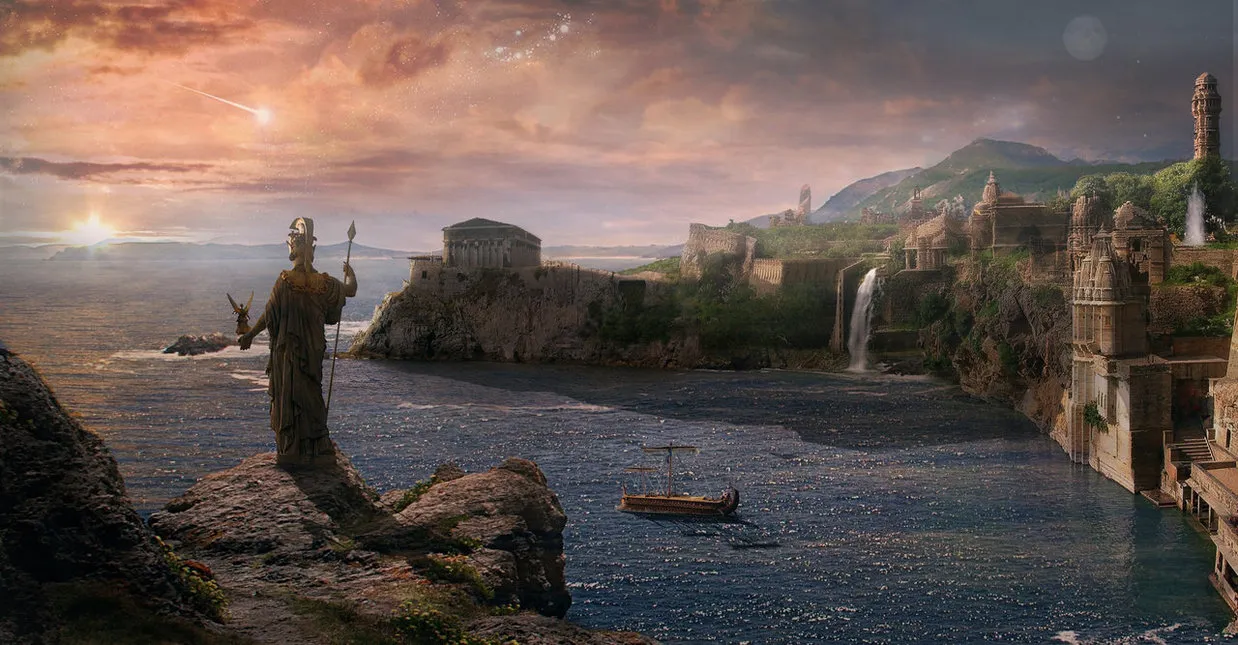by Arjun Walia, The Pulse:
 From Plato all the way to today, many scholars in the field have contemplated the existence of this highly technologically advanced ancient civilization and the reason for its downfall.
From Plato all the way to today, many scholars in the field have contemplated the existence of this highly technologically advanced ancient civilization and the reason for its downfall.
If you start talking about the lost ancient city of Atlantis, most people will probably think you’re living in ‘la la’ land. Many people are unaware that this city has been studied seriously for hundreds of years. For example, we can see that it was a subject of significant importance for researchers at the Smithsonian Institution, as emphasized by their Annual Report of the Board of Regents of The Smithsonian Institution for the year ending June 30th, 1915. TRUTH LIVES on at https://sgtreport.tv/
In the report, author M. Pierre Termeir, a member of the Academy of Sciences and Director of Service of the Geologic Chart of France, gives a lecture regarding the Atlantean civilization. He makes a compelling case for further study of this lost city:
“After a long period of disdainful indifference, observe how in the last few years science is returning to the study of Atlantis. How many naturalists, geologists, zoologists, or botanists are asking one another today whether Plato has not transmitted to us, with slight amplification, a page from the actual history of mankind. No affirmation is yet permissible; but it seems more and more evident that a vast region, continental or made up of great islands, has collapsed west of the Pillars of Hercules, otherwise called the Straight of Gibraltar, and that its collapse occurred in the not far distant past. In any event, the question of Atlantis is placed anew before men of science; and since I do not believe that it can ever be solved without the aid of oceanography, I have thought it natural to discuss it here, in this temple of maritime science, and to call to such a problem, long scorned but now being revived, the attention of oceanographers, as well as the attention of those who, though immersed in the tumult of cities, lend an ear to the distant murmur of the sea.”
You can read this full report here, starting on page 219.
In his lecture, M. Termeir goes on to present zoologic, geographic, and geologic data to support the existence of the lost Atlantean civilization. Not only that, archaeological discoveries on the ocean floor have also raised some questions. We will get to a more recent example later on in the article.
Plato’s Description of Atlantis
Plato, the ancient Greek philosopher, provides a description of Atlantis in his dialogue Critias, which was never completed. The following is a summary of his depiction, these are a few of many points I am taking from Manly P. Hall, the founder of the Philosophical Research Society, from one of his many works, The Secret Teachings of All Ages.
- Atlantis was inhabited by ‘earth-born’ and ‘primitive’ human beings. One of them was wooed by the god Poseidon, who interbred with the human beings, and they eventually bore five children. This interbreeding between gods and humans is a common theme in many historical texts found throughout the world.
- The land was divided into concentric zones of land and water. Two zones of land and three zones of water surrounded the central island, which had warm springs of water and cold springs of water.
- Atlantis became an established country, with a wise government and an industry that sprung them to advanced technological heights — beyond even what we have reached today.
- Atlantis had limitless resources, wild animals, and precious metals, and was heavily populated.
- Atlantis was full of large and beautiful palaces, temples, docks, and a network of various bridges and canals that united different sections of the kingdom.
- White, black and red stones were used in the construction of public buildings. “They circumscribed each of the land zones with a wall, the outer wall being covered with brass, the middle with tin, and the inner, which encompassed the citadel, with orichalch. The citadel, on the central island, contained the palaces, temples, and other public buildings. In its center, surrounded by a wall of gold, was a sanctuary dedicated to Cleito and Poseidon.”
- Atlantis had a number of gardens, full of hot and cold springs. There were countless temples, public baths, and exercise facilities for both man and animal.
- “The part of Atlantis facing the sea was described as lofty and precipitous, but about the central city was a plain sheltered by mountains renowned for their size, number, and beauty. The plain yielded two crops each year, in the winter being watered by rains and in the summer by immense irrigation canals, which were also used for transportation. The plain was divided into sections and in time of war each section supplied its quota of fighting men and chariots.”
- Atlantis was massive, ruled by multiple kings who all had control over their land. Their relationships with the other kings were governed by an original code of ethics that was engraved by the first ten kings. “The chief laws of the Atlantean kings were that they should not take up arms against each other and that they should come to the assistance of any of their number who was attacked.”
The Downfall of Atlantis
These are the essential points Plato makes about Atlantis. He described it as a great and powerful empire, almost magical, and said that this was the same empire which attacked the Hellenic states. He attributes the power and glory they tasted after this venture to their eventual demise, writing that the love for these ego-driven desires that soon developed among Atlantean kings “lured” them from “the pathway of wisdom and virtue.”




